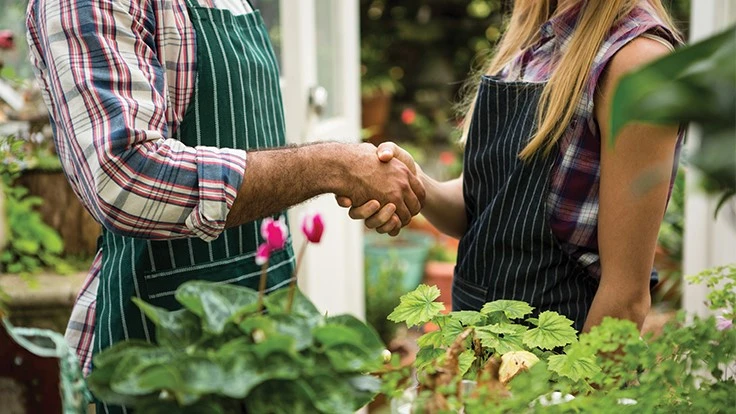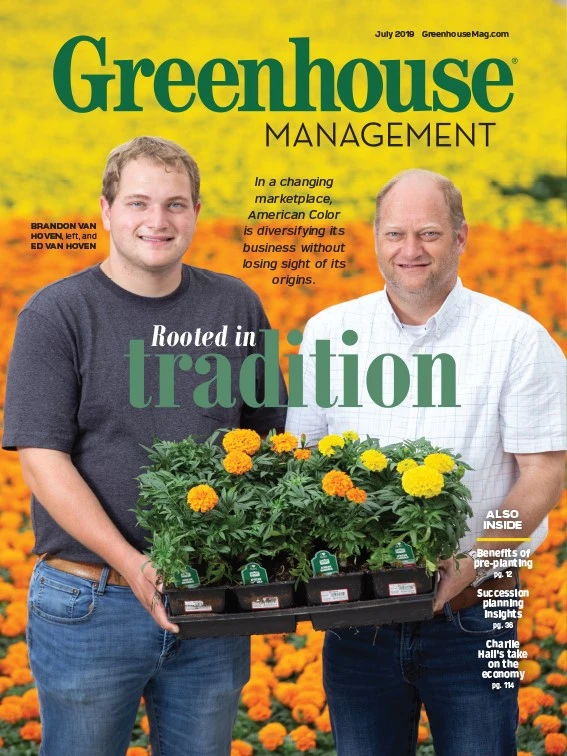
_fmt.png)
While we all share the same end customer, as growers, retailers and landscapers, we don’t always prioritize building solid partnerships with one another to best serve those customers. That said, when it comes to the relationships between grower and retailer, co-dependence is a reality and relationships of trust are necessary. Making meaningful partnerships across the industry is how we all thrive.
The retail market for plants certainly has shifted significantly over the past decade, with many new non-industry players getting into the game of online retailing. You may find yourself in a situation where you simply don’t have as many independent garden centers to sell to, or they just aren’t buying as much volume. You may need to work to build new partnerships with non-traditional retailers and the new breed of urban plant shops that are all the rage. You may even be in a situation where selling to mass merchants is your only viable option. Whatever the case, marketing yourself as a wholesale grower — both to the end consumer and your retail partners — has become increasingly important.
While most growers seem to focus most of their marketing energy on product, it’s the partnerships (not just the plants) that need some TLC.
Recruiting
Expecting your retailers to come to you is no longer a sustainable path. Active recruiting to keep your customer pipeline moving is essential. Getting together with local retailers and landscapers is a great first step in building new partnerships and improving existing ones. Both one-on-one and group gatherings help build exposure and trust with your buyers.
Tip: Make sure your account reps are setting up pre-scheduled meetings with retail buyers. Time is a valuable resource and unscheduled “pop-ins” were not appreciated during my retail buying days.
New kids on the block
Many of the new urban plant shops and small indie garden centers popping up around the country are started and run by people from outside the industry, often with little or no horticultural experience. They don’t always have a good understanding of how the plant supply chain works, or about best buying practices. They don’t have an intimate understanding of how plant growers work or do business — and they may not even know you exist as a business. As a grower, you not only need to introduce yourself, but you may also need to train up these new retail outfits.
Tip: Make sure you have a new customer packet (and an up-to-date website) put together to bring to your first one-on-one meeting. Include information on exactly how to place orders, contract growing opportunities and special services.
Open your doors
Open-house events are also a great way to introduce yourself to new retailers and touch base with current customers. Such events are an excellent opportunity to find out what your customers really want and need from you and what new products they are responding to. It’s also a great opportunity for customers to have rare facetime with your customer service staff, growers and support staff to further build familiarity and trust. Make sure to incentivize attendance by creating a valuable experience for your customers and prospects.
Tip: Schedule educational programming opportunities that qualify for CEUs so attendees can make the most of their visit.
Partner from within
Keeping and growing a good current customer is always less costly than acquiring a new one. Improving relationships with existing customers and improving their average sale should be priority No. 1. Especially if you find yourself with fewer retail buyers in your market area. The first question you should ask yourself is, “What can I do to improve their customer experience with our company?” There are a few key factors that will either maximize or diminish your retail partnerships.
Ease of ordering: How easy — or difficult — do you make it to order? I mean both for contract growing and on spec buying. The ability to order your product online is a huge time-saver for retail buyers. Not only will you get your orders faster, you’ll also probably see an increase in order size. During my days of retail buying, I calculated that I typically increased my order size by 30% when I could order online and see images of the available plants. In turn, the increased sales increased my order frequency.
Communication: How easy — or difficult — is it to talk to someone at your company or get a quick email response? Can I text my account rep? Faster and more efficient communications translate to trust and sales. If you don’t have dedicated account managers or customer service reps who can quickly and efficiently handle questions and ordering needs, you’re going to lose ground with your retailers.
Flexibility: As retailers adapt to a quickly changing market, flexibility has become more important. How quickly can you expedite a last-minute order or manage an urgent order change? Are you willing to do small contract grows for niche retailers? Retailers will prioritize partnerships that allow them to adapt and respond to their customer needs most quickly.
Customization: To take your partnership to the next level, retailers may want POP customization. Perhaps a customized mix of plant material exclusive to the retailer can help them gain an edge. Customized pre-printed plant tags may help them expedite receiving and inventory control. Be willing to discuss custom programs and services with individual retailers to gain their confidence and help them grow.
No matter whether you’re considering partnering with a mass merchant, or you want to focus on small independent retailers, making a good target customer match is always the key to success. If both partners are focused on the same goal — a happy and successful end user — together you can build long-lasting and profitable partnerships.

Explore the July 2019 Issue
Check out more from this issue and find your next story to read.
Latest from Greenhouse Management
- Anthura acquires Bromelia assets from Corn. Bak in Netherlands
- Top 10 stories for National Poinsettia Day
- Langendoen Mechanical hosts open house to showcase new greenhouse build
- Conor Foy joins EHR's national sales team
- Pantone announces its 2026 Color of the Year
- Syngenta granted federal registration for Trefinti nematicide/fungicide in ornamental market
- A legacy of influence
- HILA 2025 video highlights: John Gaydos of Proven Winners





